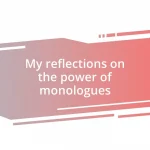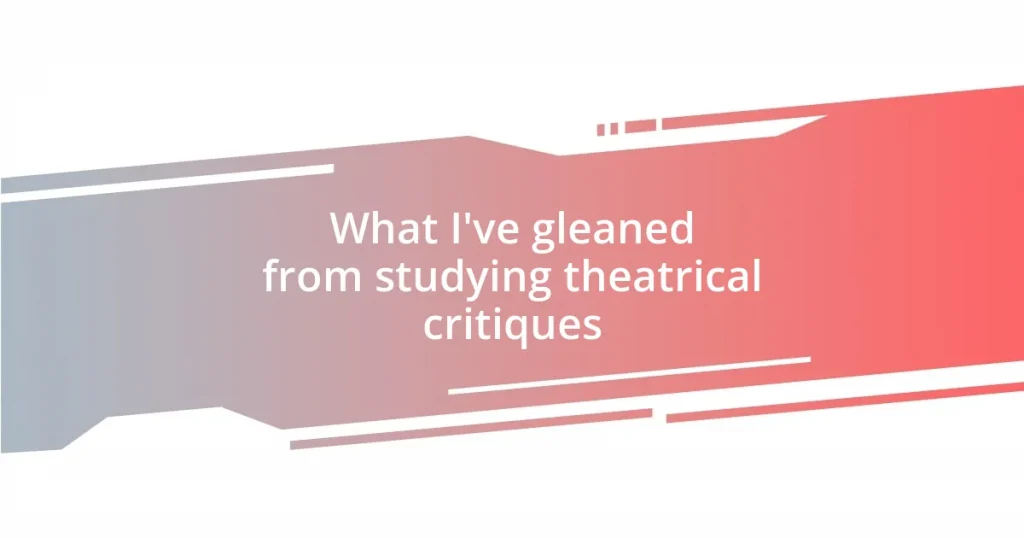Key takeaways:
- Writer’s block is a common struggle often linked to fear, perfectionism, and burnout; understanding its roots can lead to deeper creativity.
- Recognizing triggers for writer’s block, such as stress, cluttered environments, and unrealistic goals, can help manage and overcome it.
- Incorporating mindfulness and setting a creative routine can enhance focus and inspire new ideas in the writing process.
- Finding inspiration can come from everyday life, unexpected conversations, and engaging with various art forms like music and literature.

Understanding writer’s block
Writer’s block can feel isolating, almost like being trapped in a room with no windows. I remember a time when the words just wouldn’t come, and it left me frustrated and questioning my abilities. It’s important to understand that this common struggle isn’t about lack of talent; it’s often rooted in fear, perfectionism, or even just burnout. Have you ever felt that weight on your shoulders when trying to write?
At times, I’ve discovered that my creative roadblocks stemmed from outside pressures or my inner critic’s relentless voice telling me it wasn’t good enough. In those moments, I have to remind myself that every writer experiences this at some point. It really made me ponder – what if I approached writing as a journey rather than a destination?
Sometimes, all it takes is a moment of reflection to untangle those blocked thoughts. I often revisit old notebooks filled with half-formed ideas or sketches, which spark new inspiration. Through understanding the emotional currents of writer’s block, I find that I’m not alone in this experience; it’s a shared human struggle that can lead to deeper creativity if we allow ourselves to explore its roots.

Recognizing your triggers
Recognizing your triggers is a crucial step in managing writer’s block. For me, pinpointing what sparks my struggle to write often involves introspection. I’ve noticed that stress from personal life sometimes casts a shadow over my creativity. It’s fascinating how a single comment or an overwhelming deadline can derail my focus. Have you ever felt that sudden shift in your mood affecting your writing flow?
Reflecting on my environment has also been eye-opening. I realized that writing in cluttered spaces makes me feel chaotic inside. One day, after feeling stuck for what seemed like ages, I decided to clean my workspace. The difference was remarkable; suddenly, I could think clearly, and the words started to flow. It reminded me how important it is to create a conducive atmosphere for our minds to thrive.
Lastly, I find that setting unrealistic goals often serves as a major trigger for my writer’s block. When I aim for perfection, I trap myself in indecision. I recall trying to write an article in a single session and ending up frustrated. Next time, I approached it in smaller chunks, allowing myself the grace to evolve the piece gradually. Recognizing these patterns equips me with the tools to navigate the challenges of writing more effectively.
| Triggers | Personal Insights |
|---|---|
| Stress from daily life | Often leads to distractions and inhibits creativity. |
| Cluttered environment | A clean, organized space boosts my focus and writing flow. |
| Unrealistic goals | Pushing for perfection can freeze my thoughts; smaller steps work better. |

Successful techniques to overcome block
Over the years, I’ve discovered some effective techniques to push through writer’s block that I genuinely believe can help others, too. One particularly useful method is the “freewriting” technique. I set a timer for ten minutes and write nonstop, allowing my thoughts to flow freely without self-judgment. It’s surprising how that simple act often unlocks ideas and creativity I didn’t realize were trapped within me.
- **Freewriting:** Write continuously without worrying about grammar or coherence; it helps release pent-up thoughts.
- **Mind Mapping:** Create a visual representation of your ideas. I find that sketching out connections on paper ignites new thoughts and insights.
- **Change of Scenery:** Sometimes, just stepping outside for a short walk or writing in a new cafe can refresh my mind and spark inspiration.
- **Set Small Goals:** Instead of aiming for a full article, I try writing just a few sentences. It reduces pressure and helps me get started.
- **Engage in a Creative Activity:** I often switch gears and try drawing or playing music, which helps shift my mindset and often leads to new ideas.
I’ve noticed another powerful technique is reading materials outside my usual genres. A few months ago, I picked up a book on philosophy, and surprisingly, it opened my mind to new perspectives on writing. Engaging with different forms of storytelling can stir inspiration in unforeseen ways. The beauty of such approaches lies in their ability to transform blocks into bridges, leading us toward unexpected creative paths.

Setting up a creative routine
Setting a creative routine has been a game-changer for me. I once struggled with finding the right time to write, often trying to squeeze it in between other responsibilities. Then I committed to a specific time each morning—just an hour before the day starts. It felt like reclaiming a little part of my day just for myself, and I began to notice how my mind was more open and ready to create during those quiet moments.
I also find that pairing my writing sessions with rituals can make a significant difference. For instance, brewing my favorite coffee while jotting down ideas transforms the experience from a task to a delicious habit. There’s something almost sacred about that little morning routine that primes my brain for creativity. Do you have any comforting rituals of your own that help you get into the zone?
It’s important to remember that a routine doesn’t have to be rigid. I allow myself the flexibility to change my environment and approach based on how I feel that day. There are moments when writing at home feels stifling, and a spontaneous trip to a nearby park can rejuvenate my creativity. Embracing this dynamic flow keeps my routine fresh and invigorating, preventing it from becoming monotonous. What do you think? Could a little spontaneity add spark to your writing practice?

Utilizing mindfulness practices
Incorporating mindfulness practices into my writing routine has been a transformative experience. For instance, I often take a few moments before I write to focus on my breath, allowing myself to feel grounded in the present. I’ve found that this simple act clears mental clutter, making room for creativity to bloom. Have you ever noticed how just being aware of your breath can change your entire mindset?
I also practice mindful observation during walks. When I step outside, I intentionally notice the colors of the leaves or the sounds of birds chirping, absorbing the world around me. This act of bringing my attention to nature not only calms me but also sparks unexpected ideas for my writing. I remember one particular walk where the sight of a child chasing butterflies led me to a beautiful metaphor about freedom in my work. Isn’t it fascinating how inspiration can come from simply being present?
Another method I’ve tried is guided meditation tailored for creativity. I use apps that focus on unlocking creative potential, and I often emerge from these sessions with new ideas swirling in my mind. Just the other day, after a particularly enlightening meditation, I sat down and wrote three pages without stopping. It reminded me that sometimes, quieting the mind can unleash a torrent of inspiration. Have you considered trying mindfulness practices to unlock your own creativity?

Finding inspiration in unlikely places
Finding inspiration can often strike when we least expect it. I remember one afternoon, while waiting in line at my local grocery store, I overheard a snippet of conversation between two strangers. Their humorous exchange about the complexities of adulting sparked an idea for a lighthearted story I had been struggling to develop. Sometimes, the most mundane moments in everyday life offer unexpected gems; have you ever found a story idea right in your own neighborhood?
Visiting local flea markets has also become one of my favorite sources of inspiration. As I wander through stalls filled with trinkets and old books, I can’t help but imagine the stories behind each item. There’s something captivating about dissecting the history of a tarnished silver spoon or a faded postcard. Recently, I stumbled upon a vintage typewriter that instantly transported me to another era, igniting a passion for exploring the lives of past writers. Isn’t it incredible how the artifacts of the past can breathe new life into our writing?
Sometimes, I find that inspiration flows from something as simple as a well-crafted song. Music has an uncanny way of stirring my emotions and sparking ideas. I recall driving home one evening with my favorite playlist blasting, and a particular lyric struck me deeply. It reminded me of a personal experience, prompting a flood of thoughts that later evolved into a heartfelt piece. How often do we overlook the art around us that can illuminate our path as writers?

Embracing trial and error
Embracing trial and error is a crucial part of my writing journey. I vividly remember a time when I tried to write a short story centered around a complicated character. I spent hours developing backstory, but when I finally typed those first few lines, they felt flat. Instead of scrapping it, I shifted gears, allowing myself to explore different angles and motivations. Through that process, I discovered a deeper narrative I could relate to more. Have you ever noticed how stumbling upon new perspectives can breathe life into something seemingly lifeless?
The beauty of trial and error lies in its unpredictability. I often find myself weaving through dead ends and false starts, particularly when crafting poetry. There was a day I jotted down variations of a single line, experimenting with rhythm and word choice. After several attempts, I landed on something that surprisingly resonated with my emotions. It felt like digging for treasure; I had to sift through the dirt to find something truly valuable. Can you remember a moment when persistence led you to unexpected writing breakthroughs?
What I cherish most about embracing this process is the permission it gives me to play. Just the other day, I decided to write without any self-imposed limitations, penning whatever came to mind about my day. Some sections were clumsy, others surprisingly poignant. As I revised, I recognized the gems hidden within the chaos, leading to a polished piece that reflected my genuine voice. Isn’t it liberating to realize that the path to creativity is often paved with mistakes and missteps?















